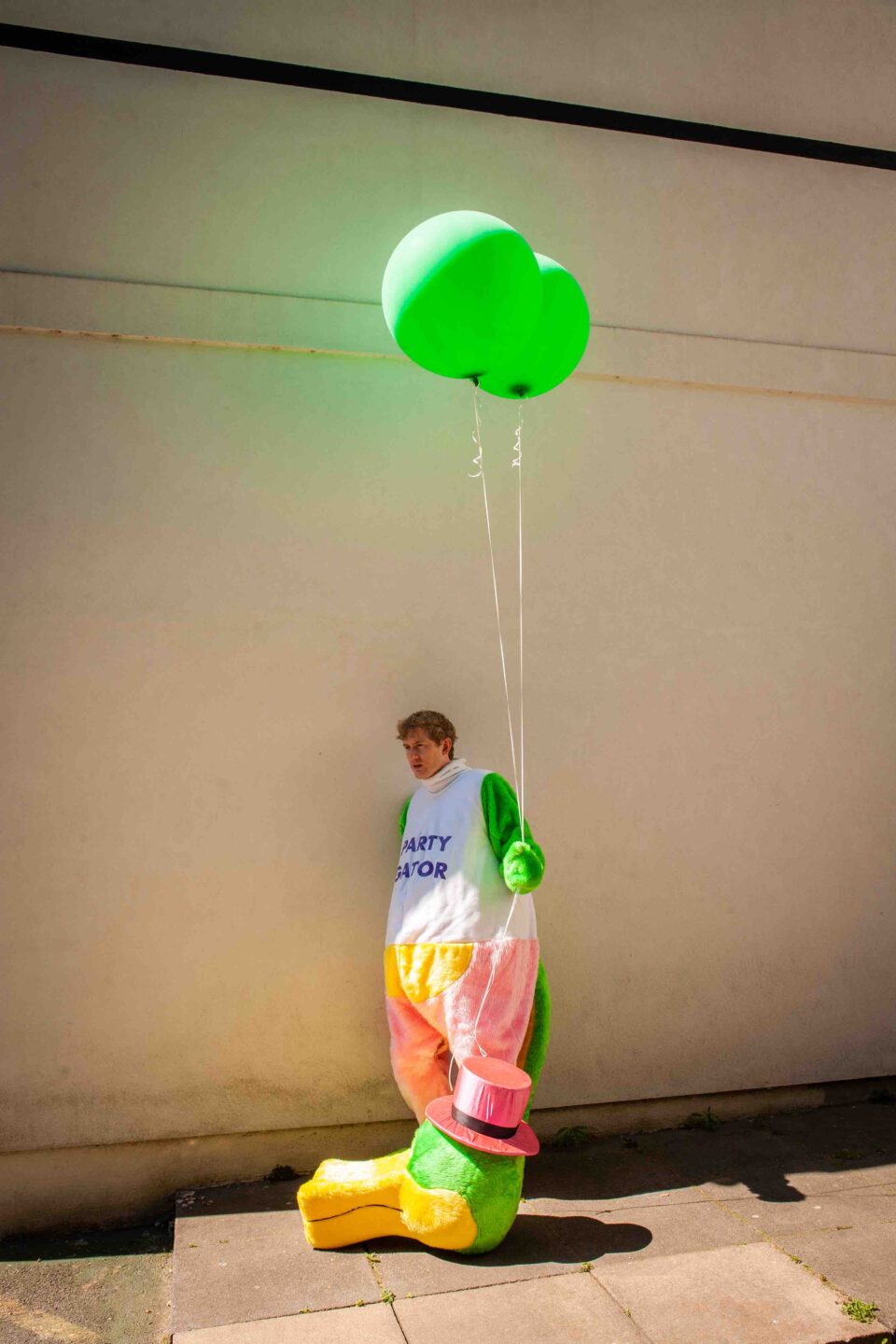You may already know who James Acaster is—or, you may be an American who’s seen downard of, like, three comedy specials over the past decade that don’t feature cranky bits about cancel culture. If you’re the latter, in brief, Acaster is responsible for roughly the fourth most widely talked-about standup special, according to conversations I’ve had within an admittedly limited sample of individuals here in the US, with Cold Lasagne Hate Myself 1999 both providing the general sense of humor Acaster specializes in and revealing most—if not all—of the most traumatic and embarrassing experiences of his life.
It’s a very different James Acaster, then, who’s the un-mic’d percussionist behind and organizer of the debut album from Temps, Party Gator Purgatory. A minimalist (and minimally silly) version of the increasingly popular Gorillaz format of experimental music boasting a laundry list of collaborators and genre influences, the record aims to salvage ideas tied to a doomed TV series he’d developed that ultimately inspired the record’s specific imagery (an ever-distressed Acaster climbing in and out of a cartoonish alligator costume) and backing instrumental (Acaster banging out beats on his childhood drum set, with jazz drummer Seb Rochford playing over top of them).
The resulting LP ranges from hip-hop (Open Mike Eagle, Quelle Chris, and WHY?’s Yoni Wolf are among the guest emcees) to jazz (the title track invokes The Lounge Lizards) to whatever you could classify Deerhoof as (Satomi Matsuzaki makes an appearance, while Acaster’s percussion often invokes the spirit of Greg Saunier). In fact, the massive roster of talent feels so integral to the project that it makes Gator feel more like one of those mid-’00s Canadian songwriter supergroups, with several names even appearing multiple times across the tracklist.
Yet behind it all lies Acaster and his eclectic sense of taste, which, according to his personal Bandcamp collection, ranges from the left-field rap and experimental sound design of his collaborators to various strains of intense metal performed by groups like Chat Pile, Panopticon, and Sightless Pit. With Party Gator Purgatory dropping this week, we spoke with Acaster about seeking out new music and how that music tends to find its way into his own recordings, while also detailing the for-now one-off Temps record (“You always have to say ‘might be,’” he assures me, “you can never say ‘that’s it’)” and some of his favorite Bandcamp purchases.

How do you go about finding new music?
I read blogs and music sites, there’s a lot of YouTubers that I subscribe to. And then just absolutely letting loose on Bandcamp and going down wormholes on there is how I discover most of my stuff. Also just word of mouth—I’ve got a lot of friends who are really into music who can point me in the direction of a good new release.
Once you kind of get the ball rolling, new music just comes to you after a while. But then the problem becomes that you have too much to listen to.
Yeah, I don’t have a Spotify account or anything, and that’s probably quite fortunate because otherwise I think I’d be getting new stuff recommended to me everyday and it would become that kind of choice paralysis you get when looking at Netflix. But there are so many artists now who I look forward to their next releases, and everyone seems to be releasing something every single year. I always feel like as soon as I even just acquaint myself with a new release, suddenly there’s another one people are excited about. What I love is when that doesn’t happen, and you just get so obsessed with one album that you listen to it all the time and you don’t care that you’re falling behind on all the new releases.
“I can’t really describe how giddy I’d feel every time I’d open my inbox and I saw I had a message from one of the musicians and it had a stem attached.”
Do you have any rituals for listening to music? Is it just whenever you can squeeze it in, or do you cycle through albums?
I just listen whenever. There might be times during the day where I wanna just pause and stop working on my laptop—it’s nice to put an album on instead and lay down for a bit with the cats and listen to some music. But mainly I’d say it’s when I’m on the move and also the gym. You kind of have to pick the right kind of album for those situations.
Right. You don’t wanna put on Sufjan while you’re lifting.
Yeah, if you’re trying to cycle really fast and some Bill Callahan song comes on it isn’t gonna help you.
I first discovered your Bandcamp collection when I noticed your mascot logo in the “supporters” section on the page for one of the albums I was purchasing. Have any of the artists you’ve purchased from ever noticed and reached out to you?
Yeah, sometimes. Bandcamp makes it easy to do that. I’ve had people email me and be like, “Are you the same James Acaster who’s that comedian?” Sometimes you kind of end up building relationships with people—sometimes working relationships, like the stuff on this album I’ve done. A lot of those relationships started over Bandcamp messages.

“I’d email them and be like, ‘It’s me, the comedian who interviewed you. I’m now making an album. It’s not a comedy album. Do you want to be involved with it? Also, I’m dressing like an alligator.’”
Oh, that’s interesting. How else did you connect with these artists?
Mainly that, then interviewing them for a book and podcast I did about the music of 2016. So when it came to making my own music, if they were the right person for the job and I could hear them on a certain song, I’d email them and be like, “It’s me, the comedian who interviewed you. I’m now making an album. It’s not a comedy album. Do you want to be involved with it? Also, I’m dressing like an alligator.”
But the album still is funny—you have artists on there like Open Mike Eagle, who has a great sense of humor. How did it feel to get their verses and be like, “Oh wow, this gets to be on a thing I’m putting out”?
It’s incredible. Christmas everyday. Just being able to receive these stems from my heroes, these icons, and be able to sit in my living room and listen back to what they’ve done and at that point be the only person who knew about it…it was incredible. And then to be given the freedom to mess around with that and make it work on the song the way I wanted it to also felt like a privilege. I can’t really describe how giddy I’d feel every time I’d open my inbox and I saw I had a message from one of the musicians and it had a stem attached—I’d look to see if there was that paper clip icon on the message, and if there was I’d be extremely excited.
“You want there to be bits in the songs that jump out at people and sound weird—that’s very much the intention as well, but we wanted it to sound like these people belong together as a band.”
Did you ever just think about hoarding them? Keeping them for yourself?
Yeah, I didn’t know if I was gonna do a big release or not, so definitely there was a point where I was thinking maybe this would just be a private thing for us, the people who made it. But the more we worked on it, the more passionate I got about it and the more the contributors urged me to not only release it but get a proper label to release it. Which was good for me to hear, that they had that belief in it as well.
The frequent reference point for the album is Gorillaz, but this feels really modest in comparison to those collaborations.
Yeah, we wanted it to feel organic, like it was a collective and not a novelty or people who didn’t belong on a song together. We wanted it to sound like these people were in a room together making a song that made sense. And that was a big part of me selecting people for each song—who would complement each other, not just who happens to be free, or who do I think is cool and just want to put on a song for the sake of it. And trying to achieve that over the internet, remotely, was a big challenge, but I’m really glad every time I play it to people and they ask, “So were you jamming in a room together?” Obviously you want there to be bits in the songs that jump out at people and sound weird—that’s very much the intention as well, but we wanted it to sound like these people belong together as a band.
Along with being minimal, the album—especially “Kept”—is fairly proggy. Was it ever your intention to do something with more pop structure?
I knew it wasn’t gonna evolve into this pop album, but I also didn’t know what people were gonna do on it. So the more people contributed to it, the more you discovered, “Oh it’s this.” “Kept” was one of the more deliberate ones where I wanted to make a kind of rap version of a math-metal song. There’s a weird prog-metal band called Sikth that were around when I was in my late-teens, early-twenties, and I really loved them. I wanted to do a modern-day experimental hip-hop version of one of their songs. I was like, “I’m gonna kitchen-sink this song and encourage the vocalist to be as weird and wacky over it as they want to, and really make this a colorful, cartoonish track.”
James Acaster’s Bandcamp Recommendations
WHY?, AOKOHIO
I’ve been a WHY? fan since Oaklandazulasylum, and it’s just amazing how they’re still making albums today that I love. Yoni’s on this Temps album, that was surreal to get to work with someone who’s been a musical hero of mine since I was a teenager, and then get to work with him on these songs—to have him completely throw himself into them. I’d really encourage anyone who hasn’t listened to WHY? to go into their back catalog, because they change it up with every album. I love that AOKOHIO is a bunch of much shorter tracks that dovetail together. It’s just a different experience than you get on any of their other records—which can be said for all their albums. Elephant Eyelash is my favorite of theirs, I also love Alopecia and Eskimo Snow, and I’ve loved a lot of the side projects they’ve done. If people like indie guitar music, you should really seek out Josiah Wolf’s solo album, Jet Lag. It’s a masterpiece—I think it’s incredible and deserves way more attention.
McKinley Dixon, For My Mama and Anyone Who Look Like Her
Every single song, incredibly strong—the way he raps, the hooks, the production. Again, it’s an album that I feel should’ve been talked about much more. It was the album that I was texting the most people about at the end of 2021. Like, you can only really afford one recommendation at the end of each year when everyone’s doing their lists and whatnot, and when you’re texting your friends you’ve gotta go for one that’s really worth their time that not many people know about. I really like his other albums before this, but I love it when an artist really leaps forward with a project, and it’s really made me look forward to this next album that he’s got coming up. I’m getting a bit impatient for it, actually.
mui zyu, Rotten Bun for an Eggless Century
My favorite song of the year is currently “Ghost with a Peach Skin.” It’s so catchy, the production’s so eerie. I’d never heard of her before this year, and I love the whole album. And that definitely feels like my own little discovery that isn’t necessarily being talked about by everyone else. I’m enjoying a lot of albums this year that everyone else enjoyed—Scaring the Hoes and whatnot—but this feels like my own little secret find that I get to enjoy for me. I just think the hooks on it are great.
Macula Dog, Orange 2
This was one album of last year where I was like, “Man, more people need to hear this. This is nuts, and doesn’t sound like anybody else.” I’d heard their stuff before—I bought their 2016 album as part of my 2016 project. Then last year they did this album that was like their attempt at a pop album, and of course it’s still completely off the wall and weird and probably unpalatable to a lot of people. But they pulled off a poppier version of their sound, and that’s always when I get really excited about a group—when they manage to mix the accessible with the innovative. When you get something that doesn’t sound like anything you’ve heard before it’s very inspiring and exhilarating, and I really feel like they pulled that off on this record.
Mal Devisa, Shade and the Little Creature
I just think Mal Devisa’s an undeniable talent, especially her album Kiid. She sounds like someone who’s been doing this for decades—a very wise performer full of amazing insights into the world. And then her follow-up Shade and the Little Creature is a more experimental take on that sound, and that’s really exciting. Working with her on [the Temps album] was amazing. She’s actually someone I’d never spoken to before this project. I just went to her cold, like, “I’m a comedian from the UK”—which, you know, isn’t necessarily the best start when you’re trying to get someone to sing on an album. But she was really open. I really hope we meet one day and work together again. More people need to be aware of what she’s doing and just how undeniably, naturally talented she is. Wherever it’s coming from, it’s just really awe-inspiring. FL









